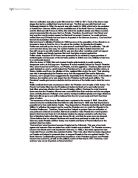Why was Bismarck a successful leader of Prussia during the period from 1862 to 1871?
History Essay
‘Why was Bismarck a successful leader of Prussia during the period from 1862 to 1871?’
Bismarck gained the title of ‘Iron Chancellor’ and the respect of the people for good reason, and is admired to this day. He is probably the most accomplished of all German politicians ever to have lived, and without his genius and mastery in politics the image of a united Germany would never have been born. Bismarck took a handful of German states and created one of the greatest European powers in existence. This course of events was only possible due to Bismarck’s numerous provocations and well-planned actions that he took.
Bismarck fully understood the game of politics, and what he must do in order to achieve his aims. From the very moment Bismarck was appointed Chancellor in 1862 he made it clear he would make no compromises and that he was fully aware that the simplicities of politics would never achieve anything by themselves saying “Not through speeches and majority decisions are the great questions of the day decided, but by blood and iron”. Through his policy of “blood and iron”, Bismarck swiftly set about securing Prussian dominance over the German states of Europe and asserting Prussia as a major power of Europe. Bismarck knew that in order for a new power to raise another must fall, and those that stand in the way must be eliminated. In this case Bismarck had his attention focused on Austria and France. Napoleon III would attempt to stop Prussia rising as it may pose a threat to French dominance in Europe, and Austria was competing for dominance over the German states of Europe. In order for Prussia to raise Austria and France must be moved out the way. Bismarck set about modernizing the Prussian military and spent vast amounts of money and time ensuring Prussia had a formidable fighting force. He tackled liberals within Germany who protested against such large amounts of money into the Military and stood his ground, and strengthened the position of the monarchy to counter liberal demands for reform. Once Prussia was ready for war, Bismarck used his mastery of politics to make it appear as if Prussia was a force for peace within Europe and its enemies the aggressors. Bismarck took advantage of the Schleswig and Holstein crisis in order assert Prussia as the great German power of Europe. At first Prussia fought alongside Austria on the side of Denmark, but once victory had been won Bismarck provoked Austria into war with Prussia over the ruling of the duchies of Schleswig and Holstein. Austria mobilized fearing a prepared Prussian attack, giving Bismarck an excuse to go to war on the pretence of self-defence. Prussian forces overwhelmed Austrian forces and within seven weeks Austria was forced to surrender, this war became to be known as the Seven Weeks War.








